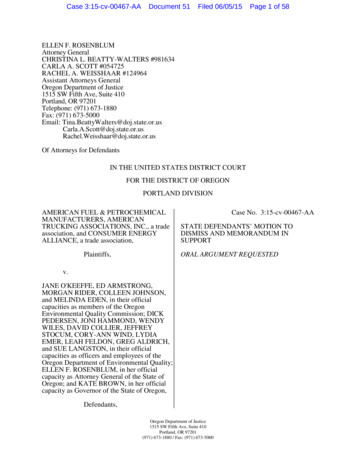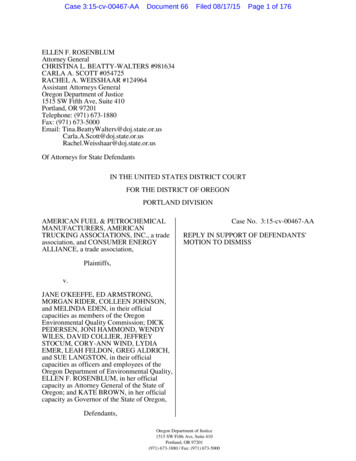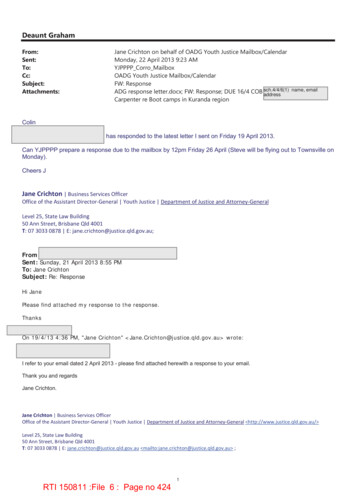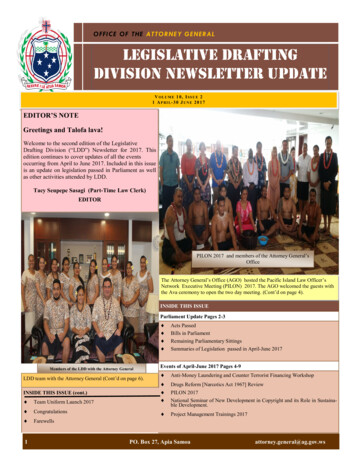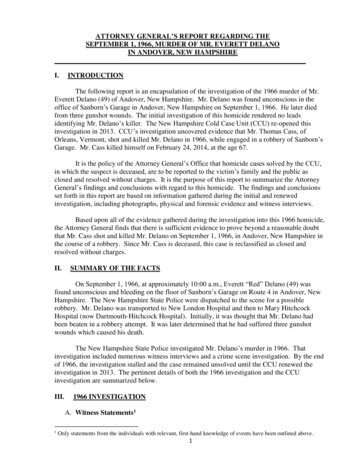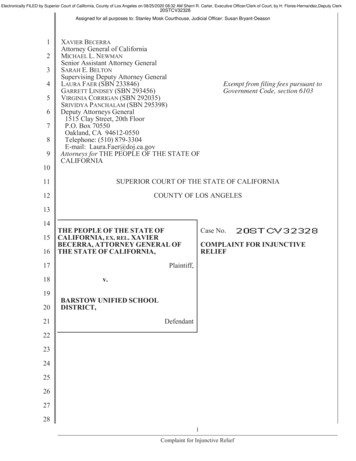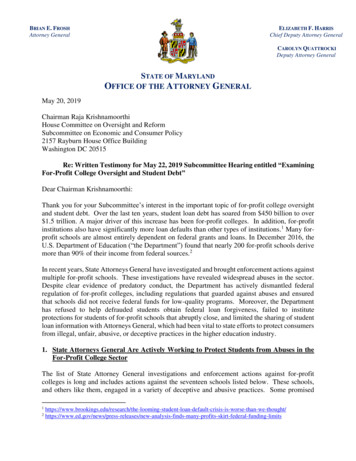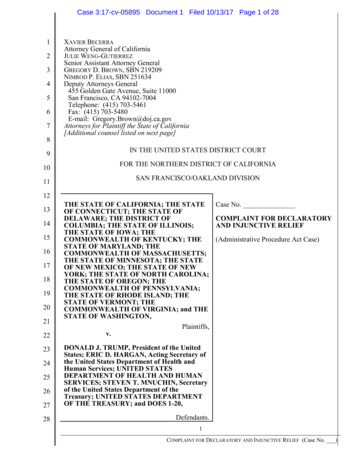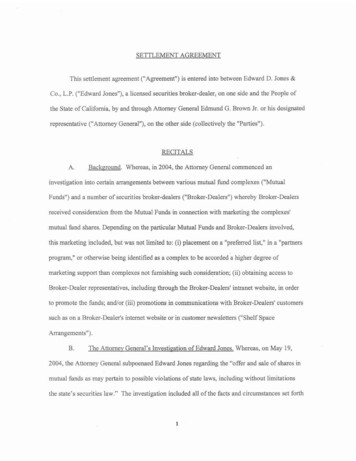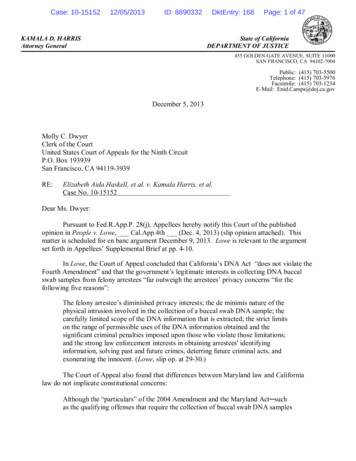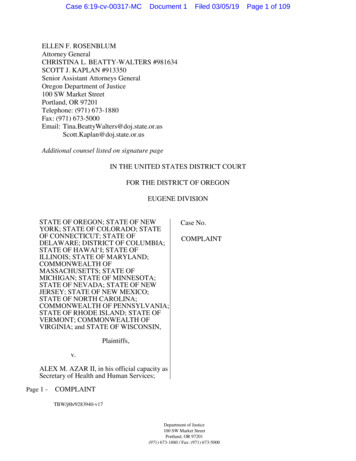
Transcription
Case 6:19-cv-00317-MCDocument 1Filed 03/05/19ELLEN F. ROSENBLUMAttorney GeneralCHRISTINA L. BEATTY-WALTERS #981634SCOTT J. KAPLAN #913350Senior Assistant Attorneys GeneralOregon Department of Justice100 SW Market StreetPortland, OR 97201Telephone: (971) 673-1880Fax: (971) 673-5000Email: .state.or.usAdditional counsel listed on signature pageIN THE UNITED STATES DISTRICT COURTFOR THE DISTRICT OF OREGONEUGENE DIVISIONSTATE OF OREGON; STATE OF NEWYORK; STATE OF COLORADO; STATEOF CONNECTICUT; STATE OFDELAWARE; DISTRICT OF COLUMBIA;STATE OF HAWAI‘I; STATE OFILLINOIS; STATE OF MARYLAND;COMMONWEALTH OFMASSACHUSETTS; STATE OFMICHIGAN; STATE OF MINNESOTA;STATE OF NEVADA; STATE OF NEWJERSEY; STATE OF NEW MEXICO;STATE OF NORTH CAROLINA;COMMONWEALTH OF PENNSYLVANIA;STATE OF RHODE ISLAND; STATE OFVERMONT; COMMONWEALTH OFVIRGINIA; and STATE OF WISCONSIN,Case No.COMPLAINTPlaintiffs,v.ALEX M. AZAR II, in his official capacity asSecretary of Health and Human Services;Page 1 -COMPLAINTTBW/j8b/9283940-v17Department of Justice100 SW Market StreetPortland, OR 97201(971) 673-1880 / Fax: (971) 673-5000Page 1 of 109
Case 6:19-cv-00317-MCDocument 1Filed 03/05/19Page 2 of 109UNITED STATES DEPARTMENT OFHEALTH AND HUMAN SERVICES;DIANE FOLEY, in her official capacity as theDeputy Assistant Secretary, Office ofPopulation Affairs; and the OFFICE OFPOPULATION AFFAIRS,Defendants.I.1.INTRODUCTIONThis lawsuit challenges a U.S. Department of Health and Human Services(“HHS”) final rule (“Final Rule”) that would fundamentally alter the Title X family planningprogram – a federal grant program that currently provides over 286 million annually in vitalfamily planning and preventive health services to low-income individuals. The Final Rule wouldimpose burdensome and unnecessary restrictions that would reduce access to care, interfere withthe patient-provider relationship, and undermine Congress’s intent in enacting Title X of thePublic Health Service Act nearly five decades ago.2.The Title X family planning program plays “a critical role in ensuring access to abroad range of family planning and related preventive health services for millions of low-incomeor uninsured individuals and others,” and is “the only federal grant program dedicated solely toproviding individuals with comprehensive family planning and related preventive healthservices.” About Title X Grants, U.S. Dep’t of Health & Human Servs.13.Title X funds have for decades ensured access to high-quality family planning andrelated preventive services for underserved families across the country. These services have1Available at out-title-x-grants/index.html.Page 2 -COMPLAINTTBW/j8b/9283940-v17Department of Justice100 SW Market StreetPortland, OR 97201(971) 673-1880 / Fax: (971) 673-5000
Case 6:19-cv-00317-MCDocument 1Filed 03/05/19Page 3 of 109allowed millions of low-income women2 to control their own reproductive destinies and, byextension, achieve greater control over their social and economic futures. The purpose of theTitle X program is to ensure equitable access to high-quality family planning services in theUnited States, regardless of a person’s economic condition – to ensure that the highest qualityfamily planning services should be available to all, not just to those who are economicallyprivileged. Access to these vital services is threatened by the Final Rule that is the subject of thissuit.4.On March 4, 2019, HHS published the Final Rule in the Federal Registeramending the regulations developed to administer Title X. Compliance with Statutory ProgramIntegrity Requirements, 84 Fed. Reg. 7,714 (Mar. 4, 2019). In this suit, the states of Oregon,New York, Colorado, Connecticut, Delaware, District of Columbia, Hawai‘i, Illinois, Maryland,Massachusetts, Michigan, Minnesota, Nevada, New Jersey, New Mexico, North Carolina,Pennsylvania, Rhode Island, Vermont, Virginia, and Wisconsin (collectively “States”)3 seek anorder vacating the Final Rule as contrary to the U.S. Constitution, contrary to the governingstatutes, and arbitrary and capricious. The States also seek an injunction against theimplementation of the Final Rule to prevent irreparable injury to the States and their residents.The States and their residents are harmed by the Final Rule, because it is contrary to their laws,policies, and sovereign and quasi-sovereign interests, and would cause them financial injury2While this Complaint addresses the Final Rule’s impact on women, its allegations are inclusiveof individuals who do not identify as women, including but not limited to some transgender men.3As used herein, “States” includes the District of Columbia.Page 3 -COMPLAINTTBW/j8b/9283940-v17Department of Justice100 SW Market StreetPortland, OR 97201(971) 673-1880 / Fax: (971) 673-5000
Case 6:19-cv-00317-MCDocument 1Filed 03/05/19Page 4 of 109from increased health care costs as a result of an increase in unintended pregnancies, cancers notdetected in early stages, and the spread of sexually transmitted infections (“STIs”). These costs– and significant public health impacts – will be caused by the Final Rule’s restriction of accessto the high-quality family planning and related preventive services for low-income individualsthat Title X has funded for decades.5.The Final Rule restricts access to high-quality health care in numerous ways.First, the Final Rule imposes a gag rule on Title X providers by prohibiting them from offeringpregnant patients “nondirective counseling” on all legal options relating to pregnancy.Nondirective counseling includes the provision of neutral, factual, accurate, and completeinformation about prenatal care and delivery, infant care, foster care, adoption, and abortion (aswell as any referrals requested by the patient). Title X programs have provided nondirectivecounseling, including referrals for pregnancy services upon request of a patient, in accordancewith not only the controlling statutory and regulatory provisions, but also standards of care andethics in the medical professions.6.Moreover, although the Final Rule appears to allow what it calls “nondirectivecounseling” by some medical professionals (physicians or providers with advanced degrees(“advanced practice providers”)), 84 Fed. Reg. at 7,789 (to be codified at 42 C.F.R. §59.14(b)(1)(i)), the Final Rule also specifically restricts counseling “as an indirect means ofencouraging or promoting abortion as a method of family planning.” 84 Fed. Reg. at 7,789 (tobe codified at 42 C.F.R. § 59.14(c)(1)). The Final Rule is, in this way, internally inconsistentand will result in high-quality providers being unwilling to participate in a program thatPage 4 -COMPLAINTTBW/j8b/9283940-v17Department of Justice100 SW Market StreetPortland, OR 97201(971) 673-1880 / Fax: (971) 673-5000
Case 6:19-cv-00317-MCDocument 1Filed 03/05/19Page 5 of 109compromises their medical and ethical standards, eroding the high standard of care that has longapplied to pregnancy counseling under Title X.7.Further, the Final Rule prohibits abortion referrals – and would do so regardlessof the professional opinions of the health care providers or the needs or desires of the patient.Yet, as HHS acknowledges in the Final Rule, nondirective counseling includes referrals uponrequest. 84 Fed. Reg. at 7,734. Under the Final Rule, a Title X provider could decline toprovide any information about abortion providers to a pregnant patient even if that is the onlyinformation the patient requests. The most a Title X provider would be permitted to do is toprovide a list of comprehensive primary health care providers, fewer than half of whom provideabortion, without identifying in any way the providers who provide abortion. Moreover, incontrast to the limits placed on providers’ ability to provide neutral, factual, and nondirectiveinformation about abortion services, the Final Rule affirmatively requires all providers to referpregnant patients for prenatal care, whether the patient wants such a referral or not. Thesechanges will violate current statutory requirements and force health care providers to violatetheir codes of ethics and professional standards, or to decline Title X funds. Either way, accessto high-quality family planning services will plummet.8.Second, the Final Rule requires strict, unnecessary, and arbitrary financial andphysical separation of any Title-X-funded provider from all facilities and entities that havevirtually anything to do with abortion. This change would require providers who provideabortions or who offer truly nondirective pregnancy counseling, including abortion referrals, todramatically restructure their activities to continue offering these services regardless of theirPage 5 -COMPLAINTTBW/j8b/9283940-v17Department of Justice100 SW Market StreetPortland, OR 97201(971) 673-1880 / Fax: (971) 673-5000
Case 6:19-cv-00317-MCDocument 1Filed 03/05/19Page 6 of 109financial ability to restructure or the needs of their patients. These irrational and arbitrary newrequirements are likely to discourage current Title X providers from participating in Title X. TheFinal Rule would, if implemented, force clinics to close or reduce their services to the detrimentof their patients, because many clinics could or would not restructure as required but could nolonger remain open or maintain service levels without Title X funds.9.These arbitrary and irrational requirements are also contrary to the expressdirection of Congress, which in 2010 prohibited HHS from adopting any regulation that, amongother things, “creates any unreasonable barriers to the ability of individuals to obtain appropriatemedical care,” “interferes with communications regarding a full range of treatment optionsbetween the patient and the provider,” “restricts the ability of health care providers to providefull disclosure of all relevant information to patients making health care decisions,” or “violatesthe principles of informed consent and the ethical standards of health care professionals.” 42U.S.C. § 18114. The Final Rule is contrary to all of these congressional limitations on HHS’sauthority.10.Because compliance with the Final Rule would require providers to compromisetheir professional responsibilities to their patients, the Final Rule’s changes would cause adramatic nationwide reduction of the number of high-quality providers who remain in the Title Xprogram. And those providers who do remain would be prohibited from providing the samehigh-quality medical advice and care that they have always provided. The Final Rule will stripproviders of their ability to provide factual, neutral, nondirective medical counseling andreferrals on all pregnancy options. That is, they will be unable to provide nondirective counselingPage 6 -COMPLAINTTBW/j8b/9283940-v17Department of Justice100 SW Market StreetPortland, OR 97201(971) 673-1880 / Fax: (971) 673-5000
Case 6:19-cv-00317-MCDocument 1Filed 03/05/19Page 7 of 109and referrals that are required by statute and that providers as medical professionals haveconcluded are required, while at the same time providers will be required to refer pregnantpatients for prenatal care even if not desired by the patient.11.The Final Rule will necessarily shrink access to high-quality care at Title Xclinics for underserved individuals in the States and around the country, to the detriment of thepublic health. The States will thus be placed in the untenable position of (a) having their abilityto compete for Title X funds severely disadvantaged by the Final Rule; (b) accepting any Title Xfunds on the condition that they comply with unlawful and unconstitutional restrictions, (c)rejecting Title X funds to preserve providers’ ability to deliver necessary medical advice andinstead apply scarce state funds to continue to provide for their residents all the services thatTitle X has for decades funded, or (d) where and if state law allows, simply abandoning theirresidents who require high-quality family planning services and who might then do without orresort to other, less safe and less medically-appropriate options.II.12.JURISDICTION AND VENUEThe Court has subject-matter jurisdiction pursuant to 28 U.S.C. §§ 1331 and2201(a). Jurisdiction is also proper under the judicial review provisions of the AdministrativeProcedure Act, 5 U.S.C. § 702.13.Declaratory and injunctive relief is sought consistent with 5 U.S.C. §§ 705 and706 and as authorized in 28 U.S.C. §§ 2201 and 2202.14.Venue is proper in this district pursuant to 28 U.S.C. §§ 1391(b)(2) and (e)(1).Defendants are United States agencies or officers sued in their official capacities. Plaintiff thePage 7 -COMPLAINTTBW/j8b/9283940-v17Department of Justice100 SW Market StreetPortland, OR 97201(971) 673-1880 / Fax: (971) 673-5000
Case 6:19-cv-00317-MCDocument 1Filed 03/05/19Page 8 of 109State of Oregon is a resident of this judicial district, and the other Plaintiffs consent toadjudication of these issues in this district. Divisional venue is proper pursuant to Local Rule 32(b) because a substantial part of the events or omissions giving rise to the claim occurred in thisdivision. The capital of the State of Oregon is located in Marion County, which is located in thisdivision.III.15.PARTIESPlaintiff the State of Oregon, acting by and through its Governor, Kate Brown,and the Oregon Health Authority, a state agency, brings this action. Governor Brown is thestate’s chief executive officer and responsible for overseeing the state’s operations and ensuringits laws are faithfully executed. The Attorney General of Oregon, Ellen Rosenblum, is the chieflaw officer of Oregon and is empowered to bring this action on behalf of the State of Oregon, theGovernor, and the affected state agencies under ORS 180.060, ORS 180.210, and ORS 180.220.16.Plaintiff the State of New York, represented by and through its Attorney General,Letitia James, is a sovereign state of the United States of America. The Attorney General is NewYork State’s chief law enforcement officer and is authorized to pursue this action pursuant toN.Y. Executive Law § 63.17.Plaintiff the State of Colorado is a sovereign state of the United States ofAmerica. The State of Colorado brings this action by and through its Attorney General, Philip J.Weiser. The Attorney General has authority to represent the state, its departments, and itsagencies and “shall appear for the state and prosecute and defend all actions and proceedings,civil and criminal, in which the state is a party.” Colo. Rev. Stat. § 24-31-101.Page 8 -COMPLAINTTBW/j8b/9283940-v17Department of Justice100 SW Market StreetPortland, OR 97201(971) 673-1880 / Fax: (971) 673-5000
Case 6:19-cv-00317-MC18.Document 1Filed 03/05/19Page 9 of 109Plaintiff the State of Connecticut, acting by and through its Attorney General,William Tong, brings this action as the chief civil legal officer of the state, and at the request ofGovernor Ned Lamont. Attorney General Tong is empowered to bring this action on behalf ofthe State of Connecticut and the Governor under Conn. Gen. Stat. § 3-124 et. seq.19.Plaintiff the State of Delaware, by and through its Attorney General KathleenJennings, brings this action. The Attorney General is the chief law enforcement officer of theState of Delaware, Del. Const., art. III, and has the authority to file civil actions in order toprotect public rights and interests. 29 Del. C. § 2504.20.Plaintiff the District of Columbia (“District”) is a municipal corporationempowered to sue and be sued, and is the local government for the territory constituting thepermanent seat of the federal government. The District brings this case through the AttorneyGeneral for the District of Columbia, Karl A. Racine, who is the chief legal officer for theDistrict and possesses all powers afforded the Attorney General by the common and statutorylaw of the District. The Attorney General is responsible for upholding the public interest and hasthe authority to file civil actions in order to protect the public interest. D.C. Code § 1-301.81.21.Plaintiff the State of Hawai‘i represented by and through its Attorney General,Clare E. Connors, brings this action. The Attorney General is Hawai‘i’s chief law enforcementofficer, and is authorized to pursue this action pursuant to Hawai‘i Revised Statutes §28-1.22.Plaintiff the State of Illinois, by and through its Attorney General, Kwame Raoul,brings this action. Illinois is a sovereign state in the United States of America. The AttorneyPage 9 -COMPLAINTTBW/j8b/9283940-v17Department of Justice100 SW Market StreetPortland, OR 97201(971) 673-1880 / Fax: (971) 673-5000
Case 6:19-cv-00317-MCDocument 1Filed 03/05/19Page 10 of 109General is Illinois’s chief law enforcement officer and is authorized to advance the state’sinterest in protecting access to critical health care services for women and men.23.Plaintiff the State of Maryland is a sovereign state of the United States ofAmerica. Maryland is represented by and through its chief legal officer, Attorney General BrianE. Frosh. Under the Constitution of Maryland, and as directed by the Maryland GeneralAssembly, the Attorney General has the authority to file suit to challenge action by the federalgovernment that threatens the public interest and welfare of Maryland residents. Md. Const. art.V, § 3(a)(2); 2017 Md. Laws, J. Res. 1.24.Plaintiff the Commonwealth of Massachusetts, represented by and through itsAttorney General, Maura Healey, is a sovereign state in the United States of America and adirect Title X grantee. The Attorney General is the commonwealth’s “chief law officer” and hasboth statutory and common-law authority to represent in litigation the commonwealth and itsagencies and officials, as well as the public interest of the people of Massachusetts. Feeney v.Commonwealth, 366 N.E.2d 1262, 1266-67 (Mass. 1977); see also Mass. Gen. Laws ch. 12, § 3.25.Plaintiff the State of Michigan, represented by and through its Attorney General,is a sovereign state of the United States of America. The Attorney General, Dana Nessel, isMichigan’s chief law enforcement officer and is authorized to pursue this action pursuant toMich. Comp. Laws § 14.28.26.Plaintiff the State of Minnesota, represented by and through its Attorney General,is a sovereign state of the United States of America. Attorney General Keith Ellison is the chiefPage 10 - COMPLAINTTBW/j8b/9283940-v17Department of Justice100 SW Market StreetPortland, OR 97201(971) 673-1880 / Fax: (971) 673-5000
Case 6:19-cv-00317-MCDocument 1Filed 03/05/19Page 11 of 109legal officer of the State of Minnesota and his powers and duties include filing lawsuits in federalcourt on behalf of the State of Minnesota. Minn. Stat. § 8.01.27.Plaintiff the State of Nevada, represented by and through Attorney General AaronD. Ford, is a sovereign state within the United States of America. The Attorney General is thechief law enforcement officer of the State of Nevada and is authorized to pursue this action underNev. Rev. Stat. 228.110 and Nev. Rev. Stat. 228.170.28.Plaintiff the State of New Jersey is a sovereign state of the United States ofAmerica. This action is being brought on behalf of the state by Attorney General Gurbir S.Grewal, the state’s chief legal officer. See N.J. Stat. Ann. § 52:17A-4(e), (g).29.Plaintiff the State of New Mexico, represented by and through its AttorneyGeneral, Hector Balderas, is a sovereign state in the United States of America. The AttorneyGeneral is New Mexico’s chief law enforcement officer, and is authorized to pursue this actionpursuant to NMSA 1978, Section 8-5-2 (1975).30.Plaintiff the State of North Carolina, represented by Attorney General Joshua H.Stein, is a sovereign state of the United States of America. The Attorney General is the state’schief law enforcement officer and is authorized to pursue this action under his constitutional,common law, and statutory p
Attorney General CHRISTINA L. BEATTY-WALTERS #981634 SCOTT J. KAPLAN #913350 Senior Assistant Attorneys General Oregon Department of Justice 100 SW Market Street Portland, OR 97201 Telephone: (971) 673-1880 Fax: (971) 673-5000 Email: Tina.BeattyWalters@doj.state.or.us Scott.Kaplan@doj.state
